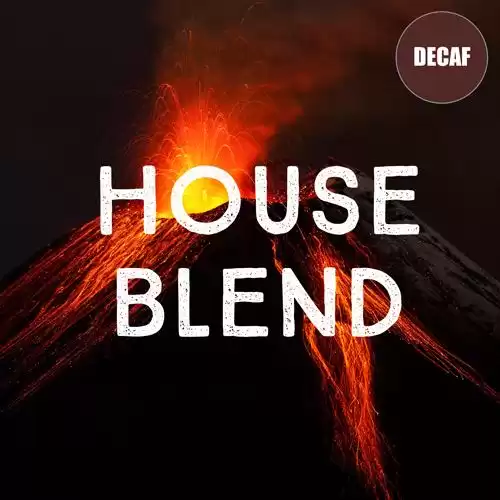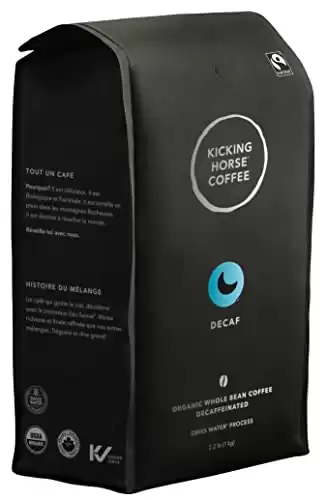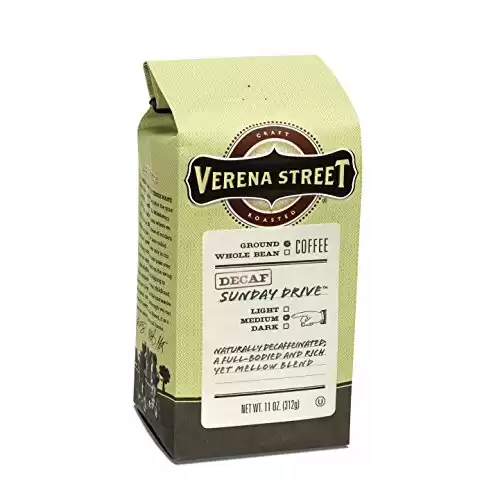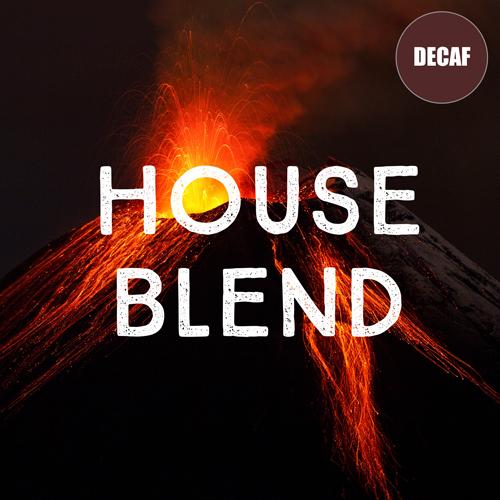I used to think that I didn’t like decaf coffee. I was of the, quite ignorant, view that if I was going to have a coffee then I needed that feeling that goes with it. You know, that little buzz, that little pick-me-up.
Well, not for the first time, I was wrong. It was the worst kind of wrong as well, it was the kind of wrong that had been preventing me from enjoying something that I love – coffee.
I always know when I’ve had enough caffeinated coffee, that buzz and tingly feeling becomes a bit more prominent and it is time to take a break. The problem is, though, that I may still want to enjoy the taste of a great coffee, but without tipping myself over the edge.
That’s where decaf coffee comes in. It is the perfect alternative that allows me to continue drinking great coffee, but without ruining my afternoon, or that night’s sleep.
|
Roast Level:
Medium
|
Roast Level:
Dark
|
Roast Level:
Medium
|
|
Tasting Notes:
Fruit, Caramel, Dark Chocolate
|
Tasting Notes:
Roasted Hazelnuts, Chocolate
|
Tasting Notes:
Butterscotch, Caramel, Hazelnut
|
Today we are going to be looking at a specific type of decaf – Swiss Water Decaf Coffee. We will look at our selection of the best Swiss water decaf coffees that are available on the market today, why we picked each, and look at what the benefits of Swiss water decaff coffee is.
Top Best Swiss Water Decaf Coffees
So without further ado, let us now walk you through our list of the best Swiss Water decaf coffees.
Volcanica House Decaf Coffee
Tasting Notes: Fruit, Caramel, Dark Chocolate
This one is from a brand called Volcanica and it is a lovely mix of coffees from South America and Central America. The name is explosive and the flavor is bold while still retaining a little bit of sweetness.
The whole beans are medium roasted which brings their true flavors out and produces a remarkable aftertaste too.
This is a decaf variant and it is made so using the Swiss Water Process which is 100 percent free of chemicals and leaves the coffee 99.9 percent free of caffeine. What’s better, it is done so without compromising the flavor.
Now, like our previous choices, this one is also sourced responsibly from coffee farms and local cooperatives. The manufacturer has developed relationships with them over many years to make sure you get the best product while they get a fair price.
Apart from this variant, the manufacturer offers over 100 other premium coffees from single origin to peaberry to estate to flavored. And if you’d like, you can even get them freshly roasted upon demand.
Kicking Horse
Tasting Notes: Roasted Hazelnuts, Chocolate
We’ll kick things off with this offering from Kicking Horse. These guys started out in a small garage in the Canadian Rocky Mountains in the late ‘90s – “pretty much in the middle of nowhere” their website states.
Well, from those humble beginnings, they have risen, not very far geographically, but certainly leaps and bounds in the world of coffee. They have been named one of the best places to work in Canada, and as their team grows and grows, so does their influence within the industry.
Their name comes from an old legend from the Rocky Mountains. It tells of an explorer that was traveling through the Rockies when he was kicked in the head by a horse.
As he lay there, motionless, his traveling buddies presumed him to be dead, to the point that they began to dig his grave. Only for him to be brought ‘back to life’ by a cup of coffee…
This fits in with the entire ethos of the company. A ‘kick ass’ cup of coffee – it all evokes the image of a drink that will give you that little extra punch, that little buzz. So I was intrigued when I came across their decaf coffee – how was it going to match up to their ‘kick ass’ branding?
I like it when a company does something completely different with its decaf. I fully understand why some companies create decaffeinated versions of some of their best sellers, but I think it is bold to do exactly what Kicking Horse has done here – create a new blend specifically for decaf coffee.
They have held true to their modus operandi though. Like the majority of their coffees, this is beautifully dark and deep.
It is from this strength that their coffees get their kick, rather than the caffeine, and that shines through with this coffee. I made it with a French press and had it black, to really experience the full depth of it.
The taste was of deep chocolate, but with complex nutty flavors in the background. It was well-balanced and had a long-lasting but mellow finish.
It is very low in acidity and is just a really pleasant, and easy, drink. It tastes powerful, yet smooth. It does give you a kick, but it is like being hit with a pillow, rather than kicked by a horse!
In terms of price, this is pretty standard for a coffee of this caliber, maybe even slightly on the cheaper end of the scale. It is perfect if you really like strong-tasting coffee, but don’t want the caffeine with it.
Verena Street
Tasting Notes: Butterscotch, Caramel, Hazelnut
Let’s head over to Iowa now, for a look at the second coffee on our list – this one from Verena Street. This family-owned company began in late 2010, in Dubuque, where they remain to this day roasting, blending, and packaging their coffee.
Their name comes from a small street on which they used to live and play – aunts, uncles, cousins, and grandparents of the same family were the only residents…
In the early 2000s, the street was removed to make way for the expansion of a freeway – the place where these cousins used to play had gone forever – only to be remembered by their coffee venture a decade later.
It was a fairly unique upbringing for Eric and Michael Gantz, the first cousins who joined forces to set up Verena Street.
And uniqueness is clearly something they hold close to themselves today, striving to separate themselves from the competition by going the extra mile to make their coffee that little bit special.
Their secret seems to lie in their blends. They bring together beans from different origins and roast levels, to create some incredibly distinctive flavors that aren’t available elsewhere.
Even the more traditional ‘staple’ have their own twists, and they have produced an exciting back catalog of coffees that I would suggest you work through if you ever get the chance.
We’re here to talk about their decaf, though. This is a medium roast, using 100% Arabica beans. I decided to try this using the pour-over method, and I was seriously impressed by the results.
It has a delightfully sweet flavor to it, with hints of butterscotch, hazelnut, and caramel, but you only get hints – the coffee flavor is there, with everything else just happening in the background.
The aftertaste is again incredibly smooth and long-lasting. There is virtually no acidity at all, which makes for a really pleasant drink.
It is just incredibly well-balanced, blended by a company that clearly takes the time and effort to maximize the flavors of every drink they make.
It is another coffee that is priced about where you would expect a product like this, so there is nothing to put you off there. It is a great drink for people that love medium roasts and is incredibly easy to drink.
Subtle Earth
Tasting Notes: Milk Chocolate, Honey, Caramel, Cocoa
Next up we’ll go and get a little bit of sundown in Florida as we check out Subtle Earth from coffee roasters Don Pablo.
These guys have been honing their expertise and knowledge of coffee for decades, and have become major players in the industry selling through major retailers all over America. And it all began with a love story…
Back in the 80s, the co-founder Darron Burke moved to Florida in search of adventure – and he quickly found it in the shape of the love of his life, Eliana.
She hailed from Columbia, and as they were soon over there visiting her family – Darron was smitten with the Latin culture, and their coffee.
They saw an opportunity – learn everything they could from the centuries of South American coffee-making experience, and take it back to Florida to start up there. They took their name from the nickname that Eliana’s father had given to Darron – Don Pablo.
They focus on small-batch coffee roasting, and they slow roast to ensure that they get the best results.
Their Master Roaster is a third-generation Columbian coffee expert, but combines knowledge with modern techniques, like computer profiling so that they only use the best beans for whichever blend they are creating.
All of their coffee is made from 100% Arabica beans, and they take a very hands-on approach to sourcing the very best beans from all over South America.
The Subtle Earth decaf is made with beans from Honduras – certified organic and then decaffeinated with the Swiss Water method.
I decided to use a traditional drip coffee machine to make a drink, following their instructions of 10g of coffee to 177 ml of water (and yes, I was that precise!).
The result was a fantastic cup of coffee. A medium-dark roast with a full body. The first thing that hits you is the chocolatey flavor – so rich and sweet.
There is a hint of caramel as well, and a slightly bitter, but by no means unpleasant, bite to the aftertaste. A really deep coffee flavor. It may sound silly to point out the coffee flavor, but it really hits you in that aftertaste.
It is a wonderful drink and another one that is right in the middle of the price range for Swiss Water decaf coffees. This is a great option for anyone that likes a full-tasting coffee and doesn’t mind a little bitterness with it.
Mayorga Organics – Café Cubano Roast
Tasting Notes: Vanilla, Smokiness, Syrup
A company with a difference next, as we take a trip over to Rockville, Maryland, for our next decaf coffee – this one is from Mayorga Organics. They have been roasting coffee since 1997, driven by an insatiable urge, not just to make great coffee, but also to make a difference.
The founder, Martin Mayorga, grew up in Nicaragua having been born in Guatemala. During this time he was exposed to the poverty in the area before he moved to the US while he was still young.
He started importing coffee in the early 90s and was astonished at how antiquated the supply chain in the industry was. It hadn’t changed for 200 years.
To put it simply, in order to import coffee, the beans took the following journey: grown by the farmer, and then sold to a local broker, who would take it to the mill for preparation, who would sell it to an exporter.
They would look abroad to find an importer, who would then find a local broker, who would then sell it to a processor, who would pass it on to a distributor to take to a retailer – then the consumer would finally get their hands on a coffee that couldn’t possibly be fresh.
Martin was hell-bent on changing all that, and as a consequence, giving more of the final price back to the original farmer. It would go some way to addressing the poverty that he witnessed in the areas where he grew up in.
He is making a huge difference and producing great coffee while he’s at it. The decaf that we are looking at today, the Café Cubano Roast is a wonderful example of that.
Like all of their coffees, this is slow-roasted, and this one is inspired by the dark, syrupy coffees that Martin remembers from trips to Cuba as a boy.
Made with beans from Peru, Honduras, and Nicaragua, this makes a delicious coffee. I made it using my drip coffee machine again and drank it black. It is an incredibly full-bodied coffee, with a wonderful smokiness to it.
You certainly can taste those syrupy notes, which give it a delightful balanced flavor, and it holds on to that bold flavor into the aftertaste. It is a brilliantly powerful drink.
There is nothing to concern you about the price, so this one should certainly be of consideration. It is great for people that want to try a decaffeinated coffee that packs a bit of a punch, with a silky sweet finish.
San Francisco Bay
Tasting Notes: Almond, Chocolate, Mandarin
I am afraid we will not be offering any prizes for guessing which part of the world our next coffee hails from. We are visiting San Francisco, and specifically, going to see the Rogers Family.
In 1979, Jon and Barbara Rogers decided they were a little bit bored with the world of coffee, and wanted to start up their own company to break the mold. Now, over 40 years later, the company is run by their children and grandchildren.
They own coffee farms in Panama, Mexico, Rwanda, and Kona, with 1600 hectares of planted coffee. This has had the added benefit of making them a carbon negative company.
They have built up an extensive offering of coffee over the years, so it shouldn’t be a surprise that they have developed a magnificent decaf coffee to add to their arsenal.
One of the things that appears to unite all of the companies that we have looked at on this list is the amount of care they take over their coffee.
I guess we shouldn’t be surprised, to go to the effort of extracting caffeine using the Swiss Water method takes time, so it is only natural that the companies that put more effort into their coffee would be the ones to favor this method.
I decided to make this, ground coarsely, using a French press, and once again I drank it without milk. The first sip was deliciously sweet, with almost a hint of orange and almond, then you get hit by the smooth chocolate finish.
It is lighter than most of the other drinks that we have looked at today, and I would say probably the easiest drink – there is no bitterness or acidity, just smooth, sweet coffee.
Priced where you would expect, I would say this is a great coffee to have in the cupboard if you often have guests and you aren’t sure what to serve them. This is such an easy drink, I can’t imagine anyone taking exception to it. A definite crowd pleaser.
What Is Swiss Water Decaf?
The ‘Swiss Water’ refers to how caffeine is extracted from coffee. There are a few different methods that do the same job, but the Swiss Water extraction process has quickly become one of the most popular in recent years.
We say ‘quickly’ because its apparent rise has seemed to come out of nowhere. In truth, though, it was first developed in (you guessed it) Switzerland in the 1930s. It wasn’t until 1979, however, that it was used commercially – by Australian coffee roasters Coffex.
The process of removing caffeine comes in four steps:
Step 1: Separation
Raw, green coffee beans are used, to retain as much of the original flavor as possible. They are soaked in plenty of water. As caffeine is soluble, over time, all of the caffeine is extracted.
So that’s great – surely we’re done? Unfortunately, no: The problem is that the water also takes away a lot more than just the caffeine – the flavor goes as well. This is where the next step comes in.
Step 2: Filtration
The original beans are now discarded – they have done their job. The water is then passed through a charcoal filter. Why charcoal?
Well, it is incredibly porous so it is able to extract the caffeine from the water as it passes through – the water is now decaf water.
Step 3: Infuse
Now, we get a new batch of raw, green coffee beans and we soak them in the, now decaffeinated, water.
Once again, the water draws out all of the caffeine, but at the same time, the rich coffee flavor from the original batch of beans is infused with the new beans through the water.
The water is then passed through the charcoal filter again and is then ready to use with the next batch of beans.
Step 4: Drying
The newly decaffeinated beans are then dried to their original level of moisture and are ready to be roasted to make delicious, caffeine-free coffee.
The entire process takes between 8-10 hours.
Benefits Of Swiss Water Decaf
The overwhelming benefit of Swiss Water decaf coffee is that it is completely natural.
You will have noticed that throughout the explanation of how the caffeine is extracted above, it did not once refer to any substance or material that is in any way unnatural.
Water, a charcoal filter, and raw coffee beans – that is all that is used in the entire process of decaffeination.
Many other methods of extracting caffeine from coffee beans rely on chemicals. The most common one is methylene chloride. This is a substance that has also been commonly used in paint thinners (and in fact has been banned from such use in some areas). While it has
been used for a very long time with coffee and has been proven to be safe, it is not surprising that some people who are a little uncomfortable drinking coffee that has come into contact with it.
Another chemical that is sometimes used is ethyl acetate – now, this can be naturally derived, but when it is needed on an industrial scale it will need to be produced synthetically.
The same goes for the carbon dioxide process, which doesn’t use chemicals, but the CO2 itself is generally distilled from an industrial by-product.
It is no wonder that people who want to avoid caffeine are wary of using decaf coffee that has been produced by these sorts of substances. They are often people that care deeply about what they put into their bodies, so a completely natural process has huge appeal.
On top of the health benefits, there is also the taste. Again, we look at the other methods of caffeine extraction and we see that the theory behind them cannot possibly retain as much of the flavor.
With Swiss Water, you are preserving as much as possible, and re-introducing it to the beans, whereas the other methods will often use harsher substances that will have an effect on the flavor of the coffee.
You’re probably wondering why anybody would use any other decaffeination method if Swiss Water is so great. Well, like many questions, the answer is money.
Many of the other processes make it possible to reuse the caffeine that is extracted, which is more obviously profitable for the company.
Also, 8-10 hours is actually quite a long time to wait for the caffeine to be extracted on an industrial scale. You can imagine, I’m sure, that a chemical will do this job much quicker than water.
As such, you will probably find that Swiss Water decaf is a bit more expensive than other types. We think it is worth it though.
Final Thoughts
If you are like I used to be, and have an irrational aversion to decaf coffee, then this list should shake you out of that outdated mindset.
There is plenty here for pretty much any coffee drinker to enjoy, and I think you will be blown away by the different options that you have, and the quality of this great kind of coffee.
If you have a sensitive stomach we recommend you read our page on the best low acid decaf coffee where we only look at coffee specifically low in acid and decaffeinated as well.
Alex is a self confessed coffee addict – but he takes his love of caffeine seriously in a completely responsible way. He loves trying new coffees and testing the latest machines and is not usually fan of one button pod machines. Alex is happiest when he is tinkering with settings and milk temperatures to create the perfect cup. When not obsessing over coffee, Alex is a keen musician and plays weddings and other social events (usually fuelled by… yes, you guessed it… coffee).











